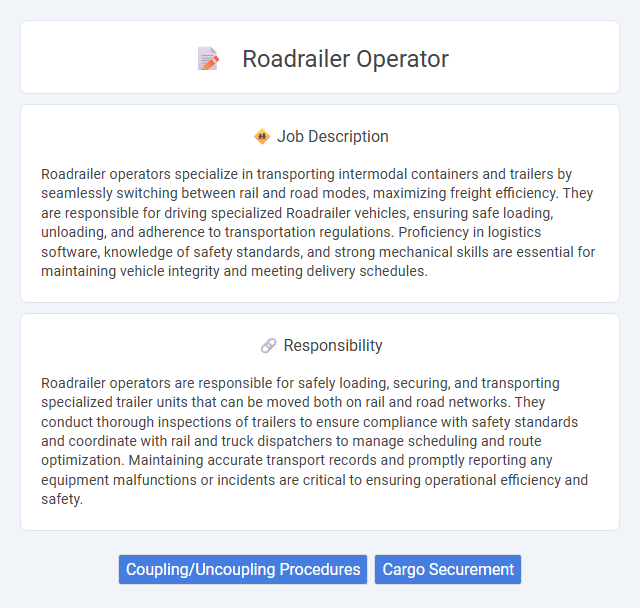
Roadrailer operators specialize in transporting intermodal containers and trailers by seamlessly switching between rail and road modes, maximizing freight efficiency. They are responsible for driving specialized Roadrailer vehicles, ensuring safe loading, unloading, and adherence to transportation regulations. Proficiency in logistics software, knowledge of safety standards, and strong mechanical skills are essential for maintaining vehicle integrity and meeting delivery schedules.
Individuals with a strong sense of responsibility and the ability to stay focused in dynamic environments are likely suitable for a Roadrailer operator job. People who possess good physical stamina and can handle the occasional stress of tight schedules may have a higher probability of success. Those who prefer routine desk work or have difficulty with manual tasks might find this role less compatible with their strengths.
Qualification
Roadrailer operator qualifications include a valid commercial driver's license (CDL) with appropriate endorsements, a clean driving record, and experience in handling heavy vehicles or trailers. Candidates must demonstrate knowledge of loading and securing cargo safely and efficiently to ensure compliance with transportation regulations. Physical fitness, strong attention to detail, and the ability to perform routine maintenance checks on roadrailer equipment are essential for job performance.
Responsibility
Roadrailer operators are responsible for safely loading, securing, and transporting specialized trailer units that can be moved both on rail and road networks. They conduct thorough inspections of trailers to ensure compliance with safety standards and coordinate with rail and truck dispatchers to manage scheduling and route optimization. Maintaining accurate transport records and promptly reporting any equipment malfunctions or incidents are critical to ensuring operational efficiency and safety.
Benefit
A Roadrailer operator likely benefits from flexible working hours and the opportunity to work with innovative transportation technology that enhances efficiency. The role probably offers competitive pay and potential for overtime, contributing to overall financial stability. Job security might be higher due to growing demand for intermodal transportation solutions in the logistics industry.
Challenge
Working as a Roadrailer operator likely presents unique challenges due to the dual nature of handling both rail and road transport systems. Operators probably need to navigate complex scheduling and coordination issues to ensure timely delivery while maintaining safety compliance across different transportation modes. The role demands adaptability and problem-solving skills to manage mechanical issues and unexpected road or rail conditions efficiently.
Career Advancement
Roadrailer operators benefit from specialized training in intermodal transportation, enabling them to handle hybrid rail and truck cargo efficiently. Career advancement opportunities include progressing to supervisory roles, logistics coordination, and operations management within the rail freight industry. Mastery of safety protocols and equipment operation enhances eligibility for higher-responsibility positions and increases earning potential over time.
Key Terms
Coupling/Uncoupling Procedures
Roadrailer operators are responsible for safely executing coupling and uncoupling procedures to ensure secure attachment between trailers and railcar chassis. Precise alignment and engagement of the kingpin with the railcar fifth wheel require thorough inspection and adherence to industry safety protocols. Mastery of these procedures minimizes operational delays and enhances the overall efficiency of intermodal freight transport.
Cargo Securement
Roadrailer operators ensure cargo securement by expertly coupling and uncoupling trailers to maintain stability during transit. They apply industry-standard techniques and safety protocols to prevent cargo shifting, damage, and loss, adhering to Department of Transportation (DOT) regulations. Proper cargo securement minimizes risks, ensuring efficient and safe transport across intermodal networks.
 kuljobs.com
kuljobs.com